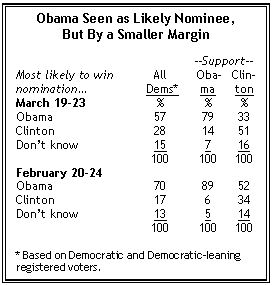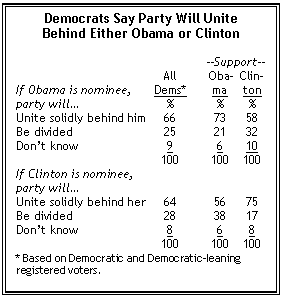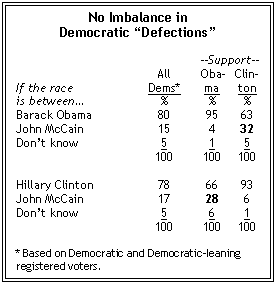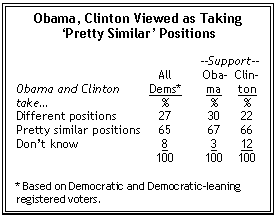
Barack Obama maintains a 49%-39% lead over Hillary Clinton among Democratic and Democratic-leaning voters, despite heavy media coverage in the past week of Obama’s controversial former pastor. Obama’s advantage over Clinton is now about the same as it was before his losses in the March 4 primaries in Ohio and Texas (49%-40%).
Age, race and gender continue to be significant factors in the Democratic race. Obama enjoys strong support among men, younger voters and blacks, while Clinton does well among white women and older voters.
Obama leads Clinton among male Democratic voters by 21 points and holds an identical 21-point advantage among Democratic voters under age 50. Black Democratic voters express even greater support for Obama and favor him over Clinton by greater than three-to-one (67% to 22%).
Women are evenly divided between Obama and Clinton (44%-43%), but Clinton holds an 11-point lead among white women. Older voters continue to be a source of strong support for Clinton; she now holds a 51% to 33% advantage among voters ages 65 and older.
Obama leads Clinton by 17 points among liberal Democrats and runs as well among college graduates and those earning $75,000 a year or more. Clinton is more competitive with Obama – though still trails narrowly – among conservative Democrats and those with a high school education.
Fewer See Obama Winning Nomination

Most Democratic voters believe that Obama will capture the party’s nomination, but the percentage predicting an Obama victory has declined since late February. Currently, 57% of Democratic and Democratic-leaning voters believe that Obama is most likely to win the party’s nomination, while 28% expect Clinton to prevail. Last month, 70% said Obama was most likely to win compared with just 17% who expected Clinton to win.
Clinton’s supporters are much more optimistic about her chances than they were in late February. Today, by a 51%-33% margin they say that Clinton, rather than Obama, is most likely to win the nomination. This is a reversal from a month ago, when 52% of Clinton supporters believed that Obama would end up winning.
Long Contest Worries More Obama Backers

The belief among Democratic voters that a long primary contest is a good thing for the party has declined, particularly among those who support Barack Obama. Currently, Democratic voters are split over whether it is good (44%) or bad (41%) for the party that the nominating contest has not been settled. A month ago, roughly twice as many said a lengthy contest was good for the party than said it was bad for the party (57% vs. 27%).
Clinton supporters are now somewhat more likely than Obama supporters to say it is a good thing that the race remains unsettled (48% of Clinton backers vs. 41% of Obama backers). In late February, more Obama supporters than Clinton supporters called the undecided nominating contest a good thing for the party (60% vs. 52%). Overall the share of Obama’s supporters who say the unsettled contest is good for the party has fallen 19 points in the past month, compared with just a four-point decline among Clinton supporters.
Little Bitterness, But Growing Dislike

Despite the concerns that Democratic voters express about the unresolved nomination contest, most say that the party will solidly unite behind the eventual nominee, whether it is Clinton or Obama. Two-thirds (66%) say the party will unite behind Obama if he is the nominee while about the same percentage (64%) expects the party to rally behind Clinton.
Majorities of Obama and Clinton supporters still believe the party will solidly unite behind the nominee even if their favored candidate does not prevail. Among Clinton’s supporters, 58% say the party will unite if Obama wins the nomination, while 32% say his nomination would divide the party. The balance of opinion among Obama supporters is virtually identical: 56% see the party uniting, while 38% see the party dividing if Clinton becomes the nominee.
In addition, most Democratic supporters of Clinton and Obama express favorable opinions of the other candidate. However, the campaign has taken a toll on positive views of both candidates among their rival’s supporters. In late December, on the eve of the Iowa caucuses, just 26% of Clinton supporters offered an unfavorable assessment of Obama. Today 41% of Clinton supporters view him unfavorably. Negative views of Clinton among Obama supporters also have risen; currently, 42% express an unfavorable view of Clinton, up from a low of 31% in early February.


When it comes to the general election, the vast majority of Democratic and Democratic-leaning voters will vote for either Obama or Clinton over John McCain. But a number of supporters on both sides currently say they might switch if their candidate does not win the nomination. Among Clinton’s backers, 32% say they would vote for McCain if Obama is the Democratic nominee, and among Obama’s backers, 28% say the same if Clinton wins the primary race. Many of these “defections” come from independent voters who only lean Democratic. When the analysis is limited to those who identify themselves as Democrats, just 20% of Obama supporters say they would not vote for Clinton in the fall, and 25% of Clinton supporters would not vote for Obama.
The Vice Presidential Question

Looking ahead to the general election, most Democrats support the idea of an Obama-Clinton or Clinton-Obama ticket. Two-thirds of Democratic voters (66%) say they would like Clinton to pick Obama as her vice presidential running mate, while 59% say they would like Obama to pick Clinton if he is the nominee.
However, just 49% of Obama supporters say that, if their candidate captures the nomination, they would like to see him select Clinton as his running mate. That compares with 69% of Clinton supporters who would favor Obama choosing Clinton for the number-two slot on the ticket, if Obama is the nominee.
By contrast, large majorities of both Obama and Clinton supporters would be comfortable with Obama as the vice-presidential nominee if Clinton prevails in the primary race. Fully 69% of Obama supporters say that, if Clinton wins, they would want her to select Obama as her running mate, while 60% of Clinton supporters say the same.
Little Difference on Issues

Notably, most Democrats do not believe that Obama and Clinton take different positions on the issues. Overall, two-thirds of Democratic and Democratic-leaning voters (65%) say that Obama and Clinton take pretty similar positions on the issues while just 27% say they take different positions.
Obama and Clinton supporters generally concur in the view that there are not substantive differences between the two candidates on the issues. Two-thirds each of Obama and Clinton supporters believe that the candidates take pretty similar positions on the issues.


